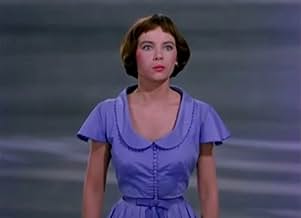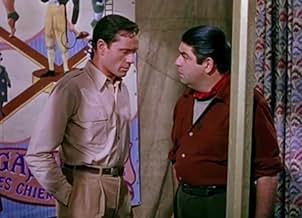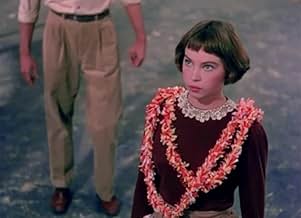VALUTAZIONE IMDb
7,2/10
4263
LA TUA VALUTAZIONE
Aggiungi una trama nella tua linguaAn orphaned young woman becomes part of a puppet act and forms a relationship with the anti-social puppeteer.An orphaned young woman becomes part of a puppet act and forms a relationship with the anti-social puppeteer.An orphaned young woman becomes part of a puppet act and forms a relationship with the anti-social puppeteer.
- Regia
- Sceneggiatura
- Star
- Vincitore di 1 Oscar
- 7 vittorie e 9 candidature totali
Jean-Pierre Aumont
- Marc
- (as Jean Pierre Aumont)
Jane Adrian
- Nautch Dancer
- (non citato nei titoli originali)
Nick Borgani
- Carnival Patron
- (non citato nei titoli originali)
Gene Conklin
- Whistler in Ballet Sequence
- (non citato nei titoli originali)
Paul Cristo
- Carnival Patron
- (non citato nei titoli originali)
George Davis
- Workman
- (non citato nei titoli originali)
Jeannine Ducasse
- French Girl
- (non citato nei titoli originali)
Bess Flowers
- Carnival Patron
- (non citato nei titoli originali)
Richard Grayson
- Flirting Vendor
- (non citato nei titoli originali)
Recensioni in evidenza
LILI, the 1953 film starring Leslie Caron in the title role, is one of the first examples of a screenplay being turned into a stage musical (CARNIVAL). Though it is common these days for Broadway to find inspiration in film sources, it was highly unusual at the time. It began life as a short story, with inspiration from the KOOKLA, FRAN AND OLLIE television program. Later made into a dark and unusual novella of sexual awakening, the tale was then adapted for the screen as LILI, a film which became the sleeper hit of 1953, eventually running in the same New York City theatre for almost 2 years. It's one, beautifully utilized song, "Hi Lili, Hi Lo" was an enormous hit and contributed to LILI's popularity.
The story, concerning the sexual and emotional coming of age of a young French girl, is unusual for its Freudian overtones and stark emotional mood. When young Lili (Leslie Caron in a gorgeously crafted and heartbreaking performance) comes to a small French village, looking for a family friend, she is devastated to learn that he has died. Without friends or family, she begs a job from a local merchant who sees her desperation as a sexual opportunity. When the merchant tries to rape Lili, she is saved by Marc, the handsome magician of a traveling carnival (Jean-Pierre Aumont). On Marc she foists all of her adult and childhood needs, her bursting sexuality along with her need to be cared for and loved. Eventually she begins working with the carnival but proves a terrible disappointment as a waitress in the carnival cafe. Lonely and desperate, she attempts to kill herself but is saved once again; this time by Paul the carnival puppeteer (a dashing Mel Ferrer in a fine performance) who speaks to her through his puppets, kindly Carrot Top, vain Marguerite, wily Reynaldo the Fox and innocent Horrible Henry the Giant. Paul, a former dancer, crippled years earlier in an accident, is full of anger and resentment but takes pity on Lili, who is so charmed by the puppets that, like a child, she forgets his presence.
The film explores their turbulent relationship as Lili becomes the star of the Carnival, charming patrons with an uncanny ability to speak to the puppets as if they are real. Complications arise as Paul begins to realize his own affection for Lili, while Lili continues to be infatuated with the magician, who's assistant (Zsa Zsa Gabor) is his wife.
With fine performances all around and an unusual atmosphere, the film has something of a cult following and is highly regarded for its frank and emotional nature. With its full-color cinematography, adorable puppets and carnival setting, this film might be mistaken for a children's story but deals, rather, with powerful adult themes. LILI may seem tame by today's standards, but given the conservativism of the 1950's as well as the strict production code in force at the time, LILI is rather shocking.
There is a very unusual dream sequence late in the movie which attempts to explore certain aspects of Lili's psyche through dance. This sequence is not entirely successful, but manages to get its point across and leads directly to the film's moving final moment. It's subtle treatment of a difficult subject is inspiring. The loss of innocence, the retreat from childhood and the desperate need for someone to love prove compelling subjects in a film that is, though imperfect, haunting.
The story, concerning the sexual and emotional coming of age of a young French girl, is unusual for its Freudian overtones and stark emotional mood. When young Lili (Leslie Caron in a gorgeously crafted and heartbreaking performance) comes to a small French village, looking for a family friend, she is devastated to learn that he has died. Without friends or family, she begs a job from a local merchant who sees her desperation as a sexual opportunity. When the merchant tries to rape Lili, she is saved by Marc, the handsome magician of a traveling carnival (Jean-Pierre Aumont). On Marc she foists all of her adult and childhood needs, her bursting sexuality along with her need to be cared for and loved. Eventually she begins working with the carnival but proves a terrible disappointment as a waitress in the carnival cafe. Lonely and desperate, she attempts to kill herself but is saved once again; this time by Paul the carnival puppeteer (a dashing Mel Ferrer in a fine performance) who speaks to her through his puppets, kindly Carrot Top, vain Marguerite, wily Reynaldo the Fox and innocent Horrible Henry the Giant. Paul, a former dancer, crippled years earlier in an accident, is full of anger and resentment but takes pity on Lili, who is so charmed by the puppets that, like a child, she forgets his presence.
The film explores their turbulent relationship as Lili becomes the star of the Carnival, charming patrons with an uncanny ability to speak to the puppets as if they are real. Complications arise as Paul begins to realize his own affection for Lili, while Lili continues to be infatuated with the magician, who's assistant (Zsa Zsa Gabor) is his wife.
With fine performances all around and an unusual atmosphere, the film has something of a cult following and is highly regarded for its frank and emotional nature. With its full-color cinematography, adorable puppets and carnival setting, this film might be mistaken for a children's story but deals, rather, with powerful adult themes. LILI may seem tame by today's standards, but given the conservativism of the 1950's as well as the strict production code in force at the time, LILI is rather shocking.
There is a very unusual dream sequence late in the movie which attempts to explore certain aspects of Lili's psyche through dance. This sequence is not entirely successful, but manages to get its point across and leads directly to the film's moving final moment. It's subtle treatment of a difficult subject is inspiring. The loss of innocence, the retreat from childhood and the desperate need for someone to love prove compelling subjects in a film that is, though imperfect, haunting.
This is one of my favorite films. It is so delightfully simple. Leslie Caron does a marvelous job of making us believe she is an awkward 16 year old in love with a magician. I can't explain exactly why I love this film--perhaps I'm a sucker for all in-love-with-someone-who's-in-love-with-someone-else stories, or maybe I have a soft spot for puppets. But this film warms me to the heart and I recommend it to all but the heart hearted cynic.
10eadoe
Of all the popular overblown, oversexed "coming of age" movies (mostly about male coming of age - starting with "The Summer of '42"), none has the honesty and truth of "Lili". Why? Because coming of age has less to do with sex (as most men think) than it has to do with an awareness of evil. The most telling line in the film is spoken by Paul's partner, who chides Paul for slapping Lili and says, "She is realizing that there is cruelty in the world, and she is learning to protect herself from it." Like Eve in the Garden of Eden, Lili's loss of innocence comes with her knowledge of evil, not her loss of virginity.
And unlike other coming of age movies that have the young actors tossing around "cute" sexual comments that don't ring true for a callow young person (because they were obviously scripted by a jaded 50-year-old male), "Lili" rings true with every note (as Paul says, "She's like a little bell that gives off a pure sound every time you strike it."). Her naivety is far more true to form -- when she is warned by one of the puppets that the lecherous puppet Renaldo "is a wolf", the innocent Lili replies, "I thought he was a fox." This is exactly the way a kid would really respond -- not "getting" the sexual reference and thinking that the comment was about the species of the animal.
I understand Audrey Hepburn beat out Leslie Caron for the Oscar that year with her amateurish performance in "Roman Holiday" -- what a travesty that was, since Audrey's performance had none of the depth and exquisite vulnerability of Leslie's performance in "Lili".
And unlike other coming of age movies that have the young actors tossing around "cute" sexual comments that don't ring true for a callow young person (because they were obviously scripted by a jaded 50-year-old male), "Lili" rings true with every note (as Paul says, "She's like a little bell that gives off a pure sound every time you strike it."). Her naivety is far more true to form -- when she is warned by one of the puppets that the lecherous puppet Renaldo "is a wolf", the innocent Lili replies, "I thought he was a fox." This is exactly the way a kid would really respond -- not "getting" the sexual reference and thinking that the comment was about the species of the animal.
I understand Audrey Hepburn beat out Leslie Caron for the Oscar that year with her amateurish performance in "Roman Holiday" -- what a travesty that was, since Audrey's performance had none of the depth and exquisite vulnerability of Leslie's performance in "Lili".
All too rarely has a film about lost innocence and earnest love been so sensitively brought to the screen. Respected screenwriter Helen Deutsch (The Seventh Cross '44) adapted Paul Gallico's (The Snow Goose) darkly observant novella "The Seven Souls of Clement O'Reilly" into an inspiring story of a naive young orphaned girl coming of age. Deutsch also maintains the opportunistic exploitation of the vulnerable girl without sensationalizing this angle.
The Academy award-winning score by brilliant composer Bronislau Kaper is nothing short of unforgettable. This beautifully produced MGM film cannot be called a musical as there's only one song but what a song! It's been universally popular for over 60years, and screenplay writer Helen Deutsch also wrote the world-renowned lyrics.
The haunting dream-ballet sequence that closes this unique movie brings both tears of joy and wonder at its stirring and visually fascinating realisation. Apart from a couple of clunky trick edits, direction, cinematography (Robert Plank - 'Strange Cargo '40) and performances - combine to create movie making at its most magical - and should be seen by all lovers of classic film art. While it might not be to everyone's taste (what ever is?) in 2004 the New York Times added Lilli to their listing of the best 1,000 movies ever made.
The WB Archive DVD delivers an excellent visual and sound transfer.
The Academy award-winning score by brilliant composer Bronislau Kaper is nothing short of unforgettable. This beautifully produced MGM film cannot be called a musical as there's only one song but what a song! It's been universally popular for over 60years, and screenplay writer Helen Deutsch also wrote the world-renowned lyrics.
The haunting dream-ballet sequence that closes this unique movie brings both tears of joy and wonder at its stirring and visually fascinating realisation. Apart from a couple of clunky trick edits, direction, cinematography (Robert Plank - 'Strange Cargo '40) and performances - combine to create movie making at its most magical - and should be seen by all lovers of classic film art. While it might not be to everyone's taste (what ever is?) in 2004 the New York Times added Lilli to their listing of the best 1,000 movies ever made.
The WB Archive DVD delivers an excellent visual and sound transfer.
this is quite an old movie, as you know. my mother wasn't even born when it came out. yet i enjoy it greatly. it is a true love story, and unlike movies of today's age, it depicts that love with elegance and style. it is not only about love, but about the "blossoming" of Lili, of how she grows into womanhood and learns the ways of the world, as well as her own world. personally, i find it all to be quite symbolic, with Lili as the symbol of good and innocence. it also has some interesting humor in it (the puppets are well characterized and amazingly personalized). i think you will fall in love with the well-rounded main characters just as i did. i hope people will not be turned off by the age of the movie (it is over 50 years old now) because i find newer love stories to be far too sexual that leaves nothing to the imagination. this movie is VERY imaginative and beautiful in its storytelling. of course, kids could watch it and enjoy it to some extent, but the language is slightly elevated and the meaning is quite deep. watching this movie as an older person truly made the difference. i hope you enjoy it.
Lo sapevi?
- QuizThis film was based on The Saturday Evening Post's Paul Gallico's short story "The Man Who Hated People", published in the 28 October 1950 edition, which was inspired by the children's puppet show Kukla, Fran and Ollie (1947). Due to the success of the film, Gallico expanded the story into a novella.
- BlooperWhen Marc plays a magic trick with his cigarette at the notions store, he actually burns Lili's hand, right before playing the trick. Lili jerks her hand apart, but she keeps on watching Marc as if nothing has happened.
- Citazioni
Lili Daurier: We don't learn. We just get older, and we know.
- ConnessioniEdited into Off to See the Wizard: Lili: Part 1 (1967)
- Colonne sonoreHi-Lili, Hi-Lo
Music by Bronislau Kaper
Lyrics by Helen Deutsch
Performed by Leslie Caron and Mel Ferrer
I più visti
Accedi per valutare e creare un elenco di titoli salvati per ottenere consigli personalizzati
Everything New on HBO Max in August
Everything New on HBO Max in August
Looking for something different to add to your Watchlist? Take a peek at what movies and TV shows are coming to HBO Max this month.
- How long is Lili?Powered by Alexa
Dettagli
Botteghino
- Budget
- 1.353.000 USD (previsto)
- Tempo di esecuzione
- 1h 21min(81 min)
- Colore
- Proporzioni
- 1.37 : 1
Contribuisci a questa pagina
Suggerisci una modifica o aggiungi i contenuti mancanti



































